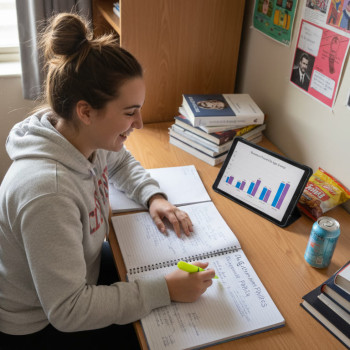Why This Matters: AP Exams, College Readiness, and Colgate’s Natural Sciences
For students who love the life and physical sciences, Advanced Placement (AP) exams are more than a test—they’re a bridge. A strong AP score can mean advanced placement in courses, potential credit, and room in your schedule for research, a double major, or a creative elective. At a selective liberal arts college like Colgate, decisions about AP credit and placement in natural science divisions (biology, chemistry, physics, and related programs) can shape your first-year experience and the trajectory of your major.
A gentle caveat before we dive in
AP policies at colleges sometimes change. Use this article as a practical, experience-oriented guide to thinking about AP strategy for Colgate’s natural sciences. Treat specific credit or placement decisions as conditional until you confirm them with Colgate’s Registrar, the departmental advisors, or official admissions materials during your application and after enrollment.

How AP Typically Interacts with Natural Science Programs
AP exams can influence your path at three common points:
- Placement — letting you start at a higher-level course without repeating basics.
- Credit — earning college credit that counts toward graduation requirements.
- Preparation — providing conceptual and lab foundations so you can engage more confidently in advanced coursework.
At many institutions, departments treat AP scores differently depending on the exam (for example, AP Biology vs. AP Physics C), the score achieved, whether you took the course with lab, and sometimes whether you also complete a departmental placement exam or interview.
Common patterns for AP in natural sciences
- AP Biology and AP Chemistry often grant placement into introductory or second-level courses when students score 4 or 5, sometimes with partial credit for lower scores.
- AP Physics is split among exam types (Algebra-Based vs. Calculus-Based/Physics C). Calculus-based AP Physics often maps more directly to higher-level physics courses for physics or engineering majors.
- Some colleges accept AP credit for general distribution requirements (e.g., natural science with lab) rather than for a specific course in the major.
- Departments sometimes require that students who place out of introductory sequences still take a laboratory or bridge course to ensure hands-on skills.
Thinking Strategically: Should You Use Your AP Credits Right Away?
There’s no single right answer. The best choice depends on your goals, confidence in the subject, and long-term academic plan. Here are three student profiles to make the decision concrete:
Profile A — The Future Major
You plan to major in biology, chemistry, or physics and want to graduate in four years with a full research or internship experience. If your AP score is strong, placing into the second course of the sequence can free a semester for a research methods course, an independent study, or early lab work.
Profile B — The Curious Explorer
You’re excited about science but undecided on a major. Using AP credit to skip an introductory course might limit your exposure to faculty and the lab experience. Many exploratory students choose to take the intro course anyway to solidify interest and build relationships with professors.
Profile C — The Dual-Interest Student
You want to double-major or combine a science with arts or humanities. AP credit can provide breathing room in your schedule for required sequences in both fields—but keep in mind that rigorous majors still expect strong lab experience and coursework depth.
Practical Steps to Take in Senior Year and After Acceptance
Use this checklist as a concrete roadmap.
- Collect your AP score report and know which exams you took, which version (e.g., Physics C), and your scores.
- Read the admitted-student materials from Colgate (often included in the admitted student portal or new-student checklist) for any posted AP policies specific to departments.
- Contact the department or departmental advisor before registration to discuss placement exams or recommended first-year courses based on your AP results and future plans.
- Consider taking departmental placement tests if offered—these can sometimes earn you a higher placement than the AP alone.
- Decide whether to bank your AP credit (save it for elective or distribution use) or convert it into course placement; policies differ on whether credit will appear on your transcript or simply adjust placement.
Sample First-Year Plans: With and Without Using AP Credit
Below are illustrative schedules showing how AP results can change a first-year plan. These are hypothetical but realistic in structure—adjust based on actual Colgate requirements and your major.
| Scenario | Fall | Spring | Benefits |
|---|---|---|---|
| Use AP Biology Score (place into Bio II) | Bio II (with lab), Calculus I, Writing Seminar, Elective | Bio Lab Methods / Research Seminar, Calculus II, Language or Gen Ed | Early research opportunities, tighter path to major depth |
| Do Not Use AP Credit (take Intro) | Intro Bio (with lab), Calculus I, Writing Seminar, Elective | Bio II (with lab), Calculus II, Language or Gen Ed | Solid foundation, more faculty contact early, less risk of gaps |
| AP Chemistry 5 (skip Gen Chem I) | Chem II / Organic Chem Prep, Physics I, Writing Seminar, Elective | Organic Chemistry I, Physics II, Research Methods | Faster path to upper-level chemistry and lab courses |
How to choose between the scenarios
- Assess your lab experience—AP classroom exposure isn’t always equivalent to a college lab.
- Speak with faculty or advisors about prerequisites for research or specific advanced courses you want to take.
- Remember the social and mentoring benefits of introductory courses: office hours, study groups, and faculty visibility matter.
What Departments Often Look For Beyond AP Scores
AP scores are important, but departments also value:
- Evidence of authentic lab experience (research internships, science fairs, independent projects)
- Strong math background—especially for physics and chemistry majors
- Letters from science teachers or mentors who can speak to your lab habits and intellectual curiosity
- Willingness to engage in undergraduate research and independent learning
Real-world context: why labs and research matter
In liberal arts environments, the difference between a student who merely knows content and one who can design an experiment, analyze messy data, and iterate their approach is enormous. Even if AP credit lets you skip content, departments may encourage or require an early lab experience so you develop those practical skills.
How to Prepare This Summer and During the First Year
Preparation matters more than perfection. Here are practical, high-leverage actions you can take.
Before you arrive
- Review key concepts from your AP course—focus on trouble spots rather than re-studying everything.
- Refresh math skills: algebra, functions, and calculus basics (if applicable).
- Read a recent scientific article or an accessible review paper in your area of interest to get used to scientific writing and data presentation.
- Prepare questions to ask departmental advisors: placement validation, lab requirements, and research pathways.
During your first semester
- Attend office hours early—introduce yourself and describe your AP background and goals.
- Join a lab group, even as a volunteer, to build skills and mentorship connections.
- Form a study group—peer learning accelerates understanding, especially in problem-solving-heavy courses.
Study Habits and Exam Strategy for AP-Level Science Students
AP exams are structured tests of concept mastery and reasoning. If you’re still planning or retaking, or if you want to stay sharp heading into college, these tactics help.
Weekly rhythm
- Active reading: summarize paragraphs into one-sentence takeaways.
- Problem sets: prioritize conceptual problems over rote memorization.
- Lab skills: practice interpreting graphs and experimental design questions.
Practice smart
- Use old exam free-response questions to practice writing clear, concise scientific explanations.
- Time yourself on multiple-choice sections to build speed without sacrificing accuracy.
- Get feedback from teachers or tutors on lab report structure and scientific argumentation.
How Personalized Tutoring Can Smooth the Transition
Many students benefit from targeted support during the late high school and early college transition. Personalized tutoring—especially one-on-one guidance—helps in three concrete ways:
- It fills knowledge gaps fast. A focused tutor can diagnose a misunderstanding in a single session and create a targeted practice plan.
- It builds confidence with strategies tailored to your learning style—problem decomposition, time management, and scientific writing techniques.
- It supports planning: mapping AP scores to course choices, preparing for placement tests, and planning research/major timelines.
Sparkl’s personalized tutoring model—one-on-one guidance, tailored study plans, expert tutors, and AI-driven insights—fits naturally here: it provides the combination of subject expertise and individualized strategy many students need when deciding whether to use AP credit or strengthen fundamentals before stepping into college-level science coursework.
Common Misconceptions and How to Avoid Them
- Misconception: A 5 on every AP exam always gives you easy credit and saves time.
Reality: Some departments prioritize college-level lab experience over credit; some credits apply only to distribution requirements—not to major prerequisites. - Misconception: Skipping intro courses looks better on a transcript.
Reality: Depth matters more than showing you skipped a class—taking a course and excelling, building research, and securing strong faculty relationships are often more valuable. - Misconception: AP scores lock you into a path.
Reality: You can often revisit decisions—students change plans after seeing the rigor of college classes, and departments are usually willing to advise.
Table: Quick Decision Guide
| Question to Ask | If Yes | If No |
|---|---|---|
| Did you score 4 or 5 on the AP exam? | Consider placement; request departmental guidance. | Think about taking the introductory course to solidify fundamentals. |
| Do you have hands-on college-level lab experience? | You may be ready to move to upper-level lab courses. | Plan to take a lab course early to develop practical skills. |
| Do you plan to major in this field? | Use AP to accelerate, but ensure lab and research options remain available. | Use intro courses to explore breadth before committing to the major. |
Examples and Short Stories
Hearing how others navigated their decisions can be instructive.
- Anna, Biology Major: Scored a 5 on AP Bio and used it for placement into Bio II. She spent her freed-up semester volunteering in a faculty lab and began paid research the following summer—work that helped her secure a competitive post-graduate fellowship.
- Marcus, Chemistry Curiosity: Earned a 4 on AP Chem but still took Gen Chem I to strengthen lab technique. He formed a close relationship with his lab instructor and later launched a senior thesis in materials chemistry.
- Sophia, Undeclared: Had AP credits but chose to retake an introductory physics course to ensure she had broad exposure. That choice helped her discover a passion for biophysics she might not have found otherwise.

Questions to Ask Advisors at Colgate (or Any Liberal Arts College)
- How does the department treat AP scores for placement versus credit?
- Are there departmental placement exams or recommended validation assessments?
- Will AP credit count toward major requirements, general education, or only elective credit?
- Are there recommended lab experiences I should take even if I place out of an introductory course?
- How will AP placement affect eligibility for early research or honors programs?
Final Thoughts: Make Choices That Serve Your Learning
The point of AP exams isn’t merely to collect credits—it’s to give you options. At Colgate’s natural science divisions, where hands-on learning and close faculty mentorship are central, the smartest strategy balances efficiency with preparedness. Use AP to create opportunity, but keep the door open for lab experiences, faculty mentorship, and deeper diving into areas that spark curiosity.
When in doubt, reach out—ask departmental advisors, review official admitted-student materials, and consider short-term, targeted tutoring if you want to strengthen specific skills before arrival. Personalized support—like one-on-one tutoring with tailored study plans and expert guidance—can make the difference between feeling ready and truly thriving in college-level science.
Actionable next steps (in the next 30 days)
- Gather your AP score report and note exam details and dates.
- Draft an email with 3 focused questions for the Colgate science department advisor.
- Identify one lab or research skill you want to strengthen before arriving and make a study plan to address it (example: graph interpretation, pipetting technique, or calculus review).
- Consider a 2–4 week tutoring plan to shore up weak spots; a short, intensive program often yields big gains.
Whatever path you choose, remember: curiosity and consistent work matter more than any single score. Use AP as a tool—one that opens doors, provided you pair it with thoughtful planning, good mentorship, and the hands-on experience that makes science come alive.
Parting encouragement
Starting college in the natural sciences is exhilarating and sometimes a little intimidating. You don’t have to be perfect—just intentional. With clear questions, a little planning, and the right support (whether from advisors, peers, or personalized tutoring like Sparkl), you’ll be in a great position to learn deeply, find mentors, and make the most of your Colgate experience.


















No Comments
Leave a comment Cancel